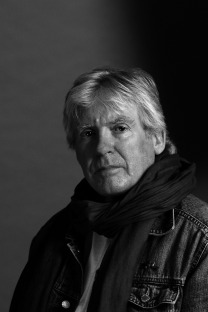Oxymoron
a form of paradox that combines a pair of contrary terms into a single expression. This combination usually serves the purpose of shocking the reader into awareness. Examples include “wise fool,” “sad joy,” and “eloquent silence.”
Sniper
David Harsent
I am tucked up here out of sight. I am tucked up here
in the bell-tower of Our Lady of retribution: my own space
well-stocked and arranged just so. This tower was raised in the year
blank-blank, the year of the crow, the year of our disgrace.
I am tucked up here in the shadow of the cross
with my ear-muffs, with my quilt and palliasse,
kneeling up but looking down, like a man at prayer.
A woman carrying water crosses the square.
She is running slowly, running not to spill. Then a child, out into clear
view, going along diagonal and running like a hare
jink-jink. I am tucked up here, a sure thing, with my sausage and beer
and a field-stove to keep my fingers supple. Days pass.
I’m more than content in my snuggery, my lair;
I have somewhere to lay my head and somewhere to piss
and, for comic disputation, the birds of the air.
With a scope pulled up to my eye, the world is close
and particular: this grandad, hugging the shade, each hair
on his head, the wet of his eye, the pre-war
coin on his fob-chain, the weave of his coat…Over there
by my friend the Marlboro Man is where
I would sit with my morning coffee: Arno’s place,
its pinball machine, its jukebox, the girl with Madonna’s face
until she showed her teeth; I would tilt my chair
to the wall and take the sun. They go in fear. They go in fear
of me. And where they go they go by my good grace.
I’m tucked up here with plenty left in store.
The night-sky floods then clears, flagging a single star,
and the city settles to silence under my piece.
The woman, the child, the grandad, are nothing…or nothing more
than what history can ignore, or love erase.
David Harsnet’s “Sniper” observes a woman “running slowly”. The oxymoron in the poem, the woman “running not to spill”, causes the reader to pause to picture what this looks like, and to consider the urgency of her need to run through this war-torn place with her precious water.

"Every gun that is made, every warship launched, every rocket fired, signifies in the final sense a theft from those who hunger and are not fed, those who are cold and are not clothed. " ~Dwight D. Eisenhower
David Harsent

David Harsent (b. 1942) won the 2005 Forward Prize for Legion, which was also shortlisted for the Whitbread Prize and the TS Eliot Award; he has also been the recipient of the Geoffrey Faber Memorial Award, an Eric Gregory Award, two Arts Council bursaries and a Society of Authors Fellowship. He is a Fellow of the Royal Society of Literature and Distinguished Writing Fellow at Hallam, Sheffield University. His work in music theatre has involved collaborations with a number of composers, but most often with Harrison Birtwistle, and has been performed at the Royal Opera House, the South Bank Centre, Carnegie Hall and the Proms.
In his introduction to this recording, Harsent describes his "tendency to work often in sequences that make use of a lyrical vocabulary to frame a broken but substantial narrative." The poems on this CD give a sense of the sequences from which they are drawn, their subjects ranging from aspects of the commedia dell'Arte Punch to the Trickster hare in Lepus. They show that his poetry is ever open to human darkness, whether in the imagined war-zones of Legion or in Sprinting from the Graveyard, his versions of poems written by Goran Simic while under siege in Sarajevo.
Harsent is justly praised for his idiosyncratic use of formal skills: his ability to spin a poem over the same few near-rhymes, placing them internally or at unexpected line-breaks, as in the poem beginning "I perch on a Bauhaus-style chrome-and-raffia / chair", from Marriage – a sequence that offers a close and startling view of what Harsent calls ‘the mysteries of domesticity’. The Lepus poems unite subjects which range from psychology and myth to film noir and cartoons, sometimes opening to naked threat, sometimes to a black humour. It is no surprise that the Observer has described Harsent's work as "bold in language, rich in reference and caustic wit".
The insistent music of Harsent's delivery leaves the stark power of his lines lingering in our memories. It also bears witness to Martin Amis's claim for Harsent's work that we "begin every poem with the certain prospect of pleasure and surprise".
(http://www.poetryarchive.org/poetryarchive/singlePoem.do?poemId=6414)
